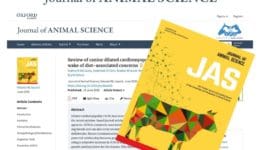Thirteen dogs have now tested positive for COVID-19. Four have died. Why are the public records being hidden?
As of August 13, thirteen dogs in the United States have been confirmed to be infected with SARS-CoV-2, the virus […]

As of August 13, thirteen dogs in the United States have been confirmed to be infected with SARS-CoV-2, the virus […]

A class action suit against sellers of prescription pet food (including Mars, Hill’s, Purina, two veterinary hospital networks, and retailer Petsmart) that was filed by six California dog and cat owners in 2016 was revived by a federal court last week, overturning a district court ruling. The claims are based on California consumer protection laws.

A family’s beloved 7-year-old German shepherd dog “Buddy” was euthanized earlier this month, 41 days after becoming the first confirmed canine case of COVID-19 in the United States. Buddy’s owners, Allison and Robert Mahoney of Staten Island, New York, have provided a gut-wrenching account of what they and Buddy endured during his final weeks.

The Mountain View Voice is reporting today that although California veterinarian Tejpaul Ghumman’s license was revoked by the state’s Veterinary Medical Board (VMB) earlier this month along with his ‘premise license’ to operate Alta View Animal Hospital, which he co-owns, Alta View Animal Hospital continues to be open for business and Ghumman is continuing to work there.

Last week, high-end specialty and emergency veterinary hospital network BluePearl announced in a press release that, based on data from all ninety of its hospitals throughout the United States, there had been a 70% increase in canine parvovirus cases during the COVID-19 pandemic compared with the same period in the previous five years.

BluePearl, a high-end network of specialty and emergency veterinary hospitals, announced last week that its hospitals have seen a 70 percent increase in parvovirus cases:

The Canine Review has learned that a dog confirmed to have tested positive for COVID-19 last week in Georgia — this was the fourth confirmed case in a dog in the United States — did not die as a result of coronavirus. Georgia Department of Public Health spokesperson Nancy Nydam told TCR in an email today: “The final necropsy results confirm the dog’s cause of death was a brain tumor. The other dog in the home is not ill and tested negative for SARS-CoV-2.”

On Monday morning, Oxford University Press chief executive officer Nigel Portwood declined to answer questions about how OUP supervises its journals and oversees its policies with regard to conflicts of interest and disclosure. His answer was limited to an apparent acquiescence to the Journal of Animal Science’s limited addendum ‘for clarity,’ which did not concede or specify the authors’ direct conflict of interest in a controversial article about canine dilated cardiomyopathy (DCM) – a progressive heart disease that can eventually lead to congestive heart failure – and possible links to certain types of diets.

Although maintaining that “that the absence of a broader COI [Conflict of Interest] statement by the authors does not constitute […]

Controversy is swirling around a prominent science journal’s article that defends the pet food industry against charges that one of its products endangers canines. Last week, the Journal of Animal Science — which describes itself on its website as “one of the most frequently cited peer-reviewed, agriculturally oriented research journals in the world” — and whose publisher is Oxford University Press — published an article that seeks to debunk the U.S. Food and Drug Administration’s reports about its investigations into cases of canine dilated cardiomyopathy (DCM) – a progressive heart disease that can eventually lead to congestive heart failure – and possible links to certain types of diets.